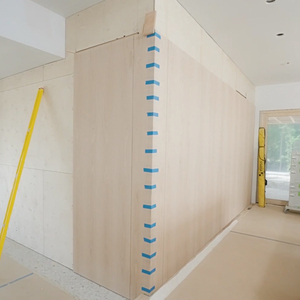When’s the Right Time to Go Out on Your Own?
A carpenter is hoping to start his own remodeling business, but he doesn't know if this is the right time or how to get started.

A carpenter is hoping to start his own remodeling business, but he doesn’t know if this is the right time or how to get started.
Auto1dact is nearing 30. His current job is a mix of supervisory and worker-bee responsibilities that earn him about $35,000 a year, and he doesn’t see much room for growth. He’s happy to have a job in an economy that has put plenty of people out of work, but in the long run, he’s convinced he can do better.
What skills can he take with him? From the sound of it, good basic carpentry, and some drywall and electrical experience, but he recognizes that he has some distance to go.
“Through my job, I’ve got a great education in residential construction, but I doubt my own abilities as a craftsman,” he writes in a post in the Breaktime business forum. “I’m handy in every aspect of home construction, but don’t have smooth, professional-level skills in anything.
“I feel really lost,” he adds, “like I’ve got all this unused potential but don’t know where to put my effort.”
Find a better job first
Before striking out on your own, davidmeiland suggests, get a better job with an established company.
“You may need more time as a lead carpenter in order to develop yourself as a job-site manager,” he says, “and you definitely need more time in the office.”
On a recommended to-do list: Learn more about sales, estimating, contracting, and subcontracting, among other things.
“You don’t mention how many total years you have in, but my belief is you need at least five and possibly many more to develop as a real journeyman carpenter,” davidmeiland says. “Probably more like 10, strictly in the field. At that point you’ll know a bunch about the other trades you need to manage. Then you need another three to five in the office in a seriously responsible role.”
Although $35,000 may not look great, it’s better than Auto1dact will probably do in the first years on his own. One mistake as a rookie contractor could cost that much alone.
JeffyT agrees: Find a job with another company. Part of his reasoning may be Auto1dact’s own description of his skills, or a general unease about not knowing quite enough to make it on his own. His ability to learn things quickly, though, will be an asset.
“You sound tentative about your own skill set but quick to pick up new stuff,” JeffyT says. “Get set up with someplace where you’ll have some leadership expectations on you, maybe some estimating and project management after you’ve been there a while. Someplace with a good reputation for quality and character.”
Learning from an employer’s mistakes
Auto1dact had hoped to pick up some of these things at his current job, but that didn’t pan out. Case in point: His boss recently needed mediation to settle a change-order bill that ran into six figures. “The client kept asking for significant rework, and we kept doing it, apparently without billing him or offering estimates for the work,” he says. “But then he got a bill and we got fired, and the project closed down and negotiations started.
“If my next move does prove to be a different employer, I’d like to work for a smoothly run company.”
But that’s a way to learn too, adds JeffyT. He also started his own business. Before he jumped ship, though, he kept a list of mistakes he saw at his company that he never wanted to make himself. The discipline made him look and listen carefully to the business practices he saw around him, some of them intentional.
Exactly right, posts hipaul. He worked for someone for a few years who was an excellent builder but a poor communicator who couldn’t estimate project costs accurately. “I watched for a few years,” he says, “and when I finally decided it was time to up and start out on my own, I took those lessons with me the most.”
Hipaul had no business plan, no idea of what the future held for him, not even that much knowledge about carpentry and construction. What he did have was a conviction that honesty with clients at all times was crucial, as was a willingness to “say ‘yes’ to just about anything.”
RELATED ARTICLES
Breaktime Business ForumA Contractor That Makes Everybody Happy
It takes a lot of skills to make it
JoeH, in business for 30 years, said it took a third of that time to learn that bean counting is just as important as the work that gets done.
“You need to be aware that knowing how to build a house and running a business aren’t the same thing,” he says. “The paperwork of a business is the most critical part of the deal, doesn’t matter whether or not you can change a blade. Do you have any idea how many pieces of paper it takes to build a $1,000,000 house?
“A smoothly run company really doesn’t have much to do with how to change a blade. It’s all about how much the blade cost, and making sure it’s accounted for at the end.”
Bobbys’s experience was much the same. He spent years remodeling, framing, and trimming for others, then ran a crew of his own, and finally went out on his own in his 30s.
“I needed every bit of skills I learned to make it,” Bobbys adds. “Everything I learned saved me from disaster.”
He did, however, lack business and selling skills, something that’s hard to pick up in books. Not only are solid carpentry skills a must, but so are selling, business, money management, and bookkeeping skills. “I always thought my trade skills would be enough,” he adds. “It was not.”
It also takes a leap of faith
While there was a strong undercurrent of caution in the posted responses, there also was a sense that determination and grit might overcome a lot of obstacles.
Kivi, for example, tells the story of the biggest builder in his city who started in his 20s with no building experience and only borrowed money. He started with a single spec house and now builds between 50 and 100 homes a year, along with strip malls, small office buildings, and retirement homes, “all of which they own and lease out.” The family is by now very wealthy.
“It all began with a commitment to the task at hand,” Kivi writes, “and it did not require even as much knowledge as you already have. You don’t need to be a craftsman on every (or any) aspect of the actual building job. There is no single right way to achieve what you want, but it won’t happen without a commitment to the dream.
“When you act like the kind of person that makes their dreams happen and can make the decisions required, you will also end up being treated like that kind of person. ”
Our expert’s opinion
We asked GBA advisor Jim Sargent, a custom builder and remodeling contractor in the Dallas area, for this thoughts. Here’s what he had to say:
“Every successful builder I know is a true entrepreneur, a person who manages risk and assumes responsibility. Most of them manage people and not tools. They manage customers, sales, craftsmen, bankers, everyone involved in each project. I have been a builder for over 35 years. My title has not changed, but my job description seems to constantly evolve. It is a very exciting and rewarding business to make things happen.”
Fine Homebuilding Recommended Products
Fine Homebuilding receives a commission for items purchased through links on this site, including Amazon Associates and other affiliate advertising programs.

Handy Heat Gun

Reliable Crimp Connectors

Affordable IR Camera




























View Comments
I did it. Force of circumstances, really - I'd a job in computers I hated, but my realtor missus had suggested to her client that I should renovate her house rather than sell it. I say that I'd cut my teeth on a paintbrush, so I wasn't a complete novice - so, picking up info and books as I went along, I learned my trade. Now I can fix anything from a faucet to build a house... All it took was application and some good customers. Being on a small island didn't hurt - after a few years I didn't need to advertise, the work came in. Sure, I've had financial setbacks, but I am still eating. When I moved to a big island I had to more or less start again - more contractors, new lumber yards, new BIs, new people, everything. This time I advertised lots, made out illustrated resumes for realtors and for the supply houses, put big graphics on my van, posted signs around, had a website, offered seniors' discounts, and generally made myself noticeable. As a renovator I fall into a slot between contractors and handymen - and there's not a lot of people doing that. True, I've a pension now that provides a bit of an income, but I still need, and want, to work... and without advertising it is still coming in.
So I'd say - go for it. I rarely earned what you are making now, but I was my own boss. Sure, if I 'phoned in sick' I got no money, but there's no incentive to perform quite so well when you work for someone else. You sound like you have a grounding - now you need the nerve. There's a saying about 'do what you want, the money will follow'. I say 'do it anyway - money isn't everything'... there's satisfaction, there's heartache, there's pride, there's terror, there's enjoyment - and if at the end of the day you've made a change to someone's home and life, well, that's good for your soul.
If you don't try you will live forever with regret. Start small and don't take on more than you know you can handle. Plan on going at least five years before your business either takes off or fails.
David Gerstel's book "Running a Successful Construction Company" has such a chapter (or maybe a section) on going out on your own including a timeframe. I can't recommend the book highly enough. Some of the information is a bit dated such as computers and software but the rest has very valuable information on the skills necessary to "make it". For someone going out on their own- it will be the best $25-30 they will spend.
I don't think you want to go out on your own until you are confident in your own abilities, because running a business is a whole nuther layer on top of the actual construction work and you will get paid based on your ability in both. You don't want to be learning both at the same time.
Experience is key to learning skills. Every time you do something, you get better at it. So get as much experience as you can on someone else's dime before you go out on your own.
Remodeling is basically custom building with the added joy of demolition. If you have not been working for a remodel or custom homebuilding contractor, you should find work with one of them now. You need a variety of experience, not just the same standard tract house construction to current codes over and over. In remodeling you are going to have to work with different construction methods on nearly every house you touch. In some instances, you need to meld with them, in others you need to bring them up to code, but you will always be seeing something new - and frequently something that the original builder screwed up because they were in too big a hurry to get the job done. (You'd better not be prone to anxiety over other people's screw-ups or you will go nuts.)
According to the Small Business Association, 56% of businesses fail within the first five years. There are a variety of reasons for this: Restricted cash flow, poor management, etc.
If a carpenter or furniture maker starts his own shop, first look at the competition. Around here, anyone who can't do anything else becomes a carpenter. The poor quality of construction in the area is the result.
Make sure you are funded. Even if it means taking out a second mortgage or securing a line of credit at the local bank.
Pick your area of expertise. It is tempting in the beginning to take any job. Resist that temptation and only accept jobs with which you have the knowledge, expertise and are comfortable.
Pick you clients. Real cheap skates will kill you, as will the very picky.
The customer is your bread and butter, but you don't have to accept everyone. Pick those folks who share your love of architecture, or furniture, or decorations.
Get the appropriate insurance, bonds or whatever your state or county require. If you bugger up a job, it is wonderful to have insurance to fall back on, and you don't want to give anyone the slightest reason to doubt your veracity as a business person.
Same goes for Workman's Comp and the like. Keep that all up to date. Hopefully you will never need it, but if you do, it is a God sent.
Take courses offered by your local Small Business Administration and community college. Knowledge is power, and this knowledge will be the power that drives you company.
Finally be true to your craft. Do not, under any circumstances, cut corners or do inferior work. If you explain properly to the client why and how and value, most of the time they will pay the little extra.
If something does not come out right, don't try to fudge it. I have, on numerous occasions, ripped my work out and did it again just to make it right.
Give the customer value for you his dollar, exceed his dreams, and you will be successful. There are those who just get by, but if you value your craft, do you really want to just get by?
John Cleveland
Clay And Wood Creations
Functional Art for the Comfortable Table, and the Table to Put It On.